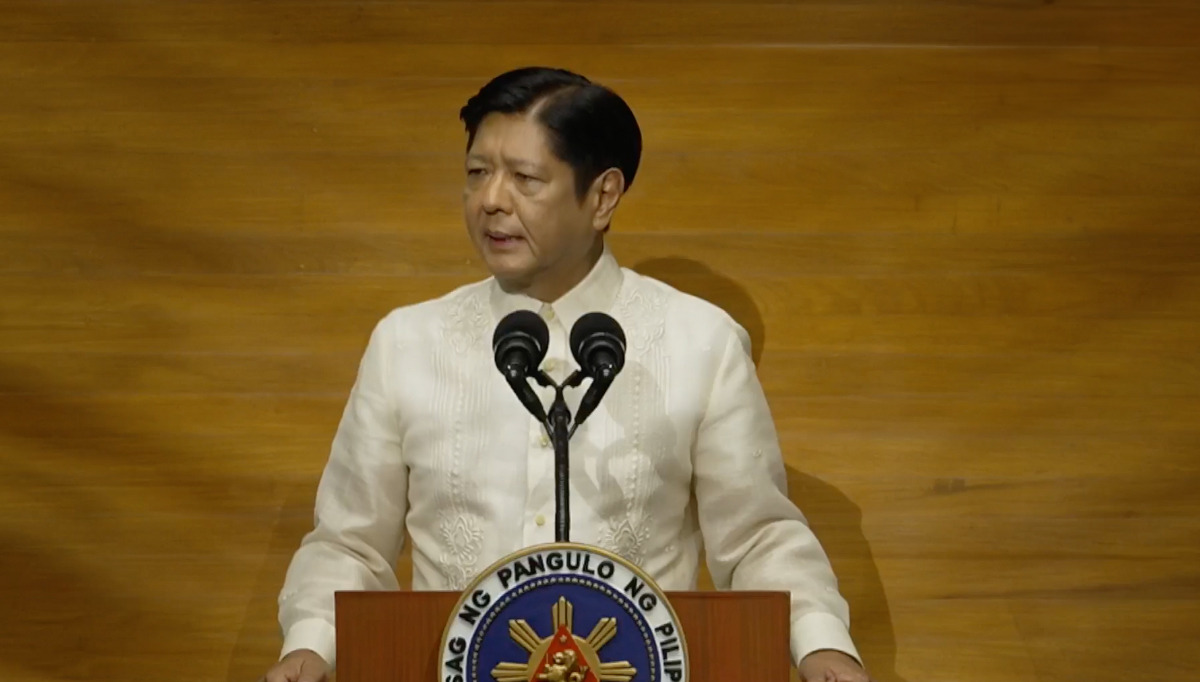
President Ferdinand Marcos Jr. during his 2024 State of the Nation Address (Sona) speech on Monday, July 22, 2024. | Screenshot from RTVM/LIVE
President Ferdinand Marcos Jr. opened his much-awaited third State of the Nation Address (Sona) touting the steps that his administration has taken to solve the one economic problem that’s eroding his political capital: inflation.
It was a preemptive strike at the core issue, using state data to highlight the government’s policies and achievements on food security.
For instance, Marcos said palay harvest hit a record-high of 20 million metric tonnes last year. But he also acknowledged that local production is still not enough to bring down the prices of rice, a staple food for Filipinos.
READ: Marcos sets allocation target in machinery, water projects, irrigation
He later went on to justify the controversial policy decisions he made in the past 12 months to tame stubbornly high rice prices, including a price ceiling on the commodity and the reduced tariff on imported rice that farmer’s groups are now challenging at the Supreme Court.
This, as he admitted that high economic growth rates are hardly translating to more affordable food for Filipinos, many of whom are losing trust and confidence in Marcos amid rising costs of living, according to opinion polls.
The president also assured the public that his administration is still more focused on boosting local farm production, even hinting at his openness to extend the lower tariff on rice and other commodities just until the end of the year and not all the way until 2028.
”The hard lesson of this last year has made it very clear that whatever current data proudly bannering our country as among the best-performing in Asia, means nothing to a Filipino, who is confronted by the price of rice at 45 to 65 pesos per kilo,” the first thing the president said after acknowledging the VIPs at his Sona.
Data showed Inflation hovered above the government’s 2 to 4 percent target band for most of the second half of 2023, before finally easing back to that range by the end of last year. But a flare-up was seen again this year due to high energy prices and the El Niñ0 onslaught, although price growth had remained within the state’s target range.
In the first six months of 2024, inflation averaged 3.5 percent.
READ: Sona 2024: Marcos admits economic gains mean little with high prices
Anthony Lawrence Borja, political science professor at De La Salle University, said Marcos’ opening salvo was an attempt to “preempt negative reactions from the public by highlighting both the emptiness of statistics and the futility of blaming external factors like the market for ordinary Filipinos.”
“Overall, it’s an attempt to allay the rumblings of our collective belly by promising food security through the continued pursuit and expansion of current policies, especially those concerning agricultural production,” Borja said.
Missing from Sona
Despite highlighting the government’s anti-inflation gameplan and state efforts to attract job-generating foreign investments amid hard times, the Maharlika Investment Fund—dubbed as the centerpiece of the Marcos administration’s economic agenda—was notably missing from the president’s speech.
For DLSU’s Borja, Marcos’ lack of mention of Maharlika—which has yet to make its first investment—might send a signal to the public that the sovereign wealth fund is “no longer a priority.”
“Without any statements on the matter in the near future, Maharlika, already questionable in the eyes of many, could descend into obscurity through the public’s chronic forgetfulness,” he said.